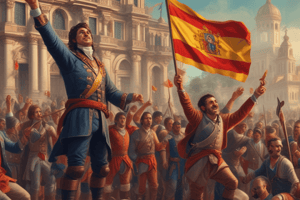Podcast
Questions and Answers
What is a social class?
What is a social class?
A social class is a group of people who share a similar socio-economic position and as a result share a similar outlook and common aims.
What do socialists traditionally view as the principal actors in history?
What do socialists traditionally view as the principal actors in history?
- Capitalists
- Social Classes (correct)
- The State
- Trade Unions
Revolutionary socialists aim to maintain a class-based society.
Revolutionary socialists aim to maintain a class-based society.
False (B)
Which of the following concepts is associated with Marx's view of social change?
Which of the following concepts is associated with Marx's view of social change?
What is the Labour Party's historical relationship with the working class?
What is the Labour Party's historical relationship with the working class?
According to social democrats, class plays an increasingly significant role in politics.
According to social democrats, class plays an increasingly significant role in politics.
The ______ Party was established in 1900 to represent the working class.
The ______ Party was established in 1900 to represent the working class.
What role did Crosland advocate for in supporting the working class?
What role did Crosland advocate for in supporting the working class?
Match the following concepts to their descriptions:
Match the following concepts to their descriptions:
Flashcards are hidden until you start studying
Study Notes
Social Class
- Social class consists of individuals with similar socio-economic positions, leading to shared outlooks and common goals.
Traditional Socialist View (Para 1)
- Social class is considered the most significant social division by socialists, vital for political dynamics.
- Classes are seen as principal historical actors, driving economic and societal changes through class conflict.
- Marx argues that the proletariat will eventually rise against the ruling class, viewing them as the "grave diggers" of capitalism.
- Luxemburg emphasizes the importance of developing class consciousness among workers to achieve revolutionary goals.
- She posits that general discontent will lead to mass strikes, resulting in worker radicalization and eventual revolution.
- Revolutionary socialists strive for a classless society, opposing class-based structures as fundamental antagonism.
- Exploitation under capitalism is seen as inevitable, necessitating a revolutionary overhaul of capitalist systems to achieve equality.
Ideological Commitment to Working Class Interests (Para 2)
- Socialists aim to represent and improve conditions for the working class, viewing this goal as fundamental.
- The Labour Party emerged in Britain to advocate for working class interests, gaining political representation since 1900.
- Key achievements include the establishment of the NHS, nationalizing critical industries, and wage laws to enhance worker conditions.
- Crosland supported increased welfare and education funding, adopting Keynesian approaches to manage economic stability and unemployment.
- Class politics have shifted for social democrats, leading to less emphasis on class issues due to deindustrialization and a decline in traditional working class industries.
- The Labour Party has adapted, focusing on broader societal issues (e.g., environmental and feminist) to appeal to diverse voter bases given the drop in support from traditional working class demographics.
- Historically, the Labour Party faced electoral defeats, illustrating the diminishing focus on class-oriented politics for mainstream parties.
Summary of Arguments
- Agreement with traditional socialist views emphasizes class struggle as a catalyst for societal change and the need for working-class representation.
- Disagreement with revolutionary socialism underscores the necessity of creating a classless society to achieve equality over continued class conflict.
- Growing insignificance of class in social democratic politics reflects broader societal shifts and the need for inclusive political strategies.
Studying That Suits You
Use AI to generate personalized quizzes and flashcards to suit your learning preferences.




